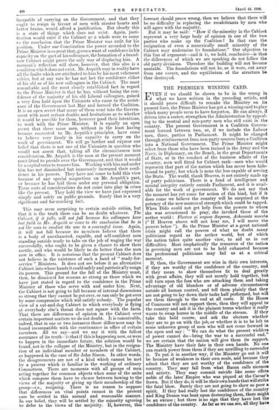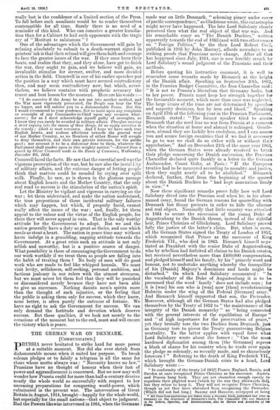THE PREMIER'S WINNING CARD. E VEN if we should be shown
to be in the wrong in what we have written in the preceding article, and it should prove difficult to remake the Ministry on its present lines, the Prime Minister has got a winning card to play which many people seem to have forgotten. He can always, if driven into a corner, strengthen the Administration by appeal- ing to the neutral and non-party men who still exist in the country. The present Government is a Coalition Govern- ment formed between two, or, if we include the Labour men, three, parties in Parliament. It might be changed through reinforcement from non-party sources from a Coalition into a National Government. The Prime Minister might select from those who have been trained in the Army and the Navy, in Diplomacy, on the Bench, in the great Departments of State, or in the conduct of the business affairs of the country, men well fitted for Cabinet rank—men who would represent that part of the nation which has never been hide- bound to party, but which is none the less capable of serving the State. The world, thank Heaven, is not entirely made up of party politicians. There is a fund of intelligence and mental integrity entirely outside Parliament, and it is avail- able for the work of government. We do not say that the moment has yet come for action of this kind, but if it does come we believe the country will be surprised at the potency of the new sources of strength which could be tapped. When Dido could not get help from the powers to whom she was accustomed to pray, she invoked those of the nether world : Flectere si nequeo Superos, Acheronta mambo (" If Heaven above will not hear me, I will move the powers below "). So the Prime Minister at a great national crisis might call the powers of what no doubt many politicians regard as the nether world, but of which the nation takes quite another view, to aid us in our difficulties. Most emphatically the resources of the nation in governing men are not to be held exhausted because the professional politicians may fail us at a critical moment.
If, then, the Government are wise in their own interests, if they are worthy of the confidence of the country, and if they mean to show themselves fit to deal greatly with great affairs, they will not merely hold together, but will turn upon the foes who are attacking them and taking advantage of old blunders or of adverse circumstances outside all human control, and tell them plainly that they are not going to lay down their tasks half performed, but will see them through to the end at all costs. If the House of Commons will not support them, then they will appeal to the country and ask it in the plainest terms whether it really wants to swap horses in the middle of the stream. If they take this bold course, and ask the electors whether they are to go on with the job, or whether it is to be left to some unknown group of men who will not' come forward in the open and say : "We can do what the present wielders of power cannot do—bring the war to a successful end," we are certain that the nation will give them its support. The Ministry have their fate in their own hands. No one can snatch power from them if they are unwilling to surrender it. To put it in another way, if the Ministry go out it will be because of weakness in their own souls, and because they admit that they are not worthy of the confidence of the country. They may fall from what Bacon calls niceness and satiety. They may commit suicide like some effete noble of the later Empire who was piqued at the Caesar's frown. But if they do, it will be their own hands that will strike the fatal blow. Surely they are not going to show so poor spirit. If they had really lost the confidence of the country and King Demos was bent upon destroying them, there might be an excuse ; but there is no sign that they have lost the confidence of the country. As far as we can see, all they have really lost is the confidence of a limited section of the Press. To fall before such assailants would be to render themselves contemptible for all time. Surely there is no need of a reminder of this kind. Who can conceive a greater humilia- tion than for a Cabinet to hail such opponents with the tragic cry of " Morituri te salutamus " ?
One of the advantages which the Government will gain by refusing absolutely to submit to a death-warrant signed in printers' ink is that their refusal will give them faith and courage to face the greater issues of the war. If they once burn their boats, and realize that they, and they alone, have got to finish the war, they ought to gain, and we believe will gain, an invaluable stimulus for sterner, swifter, and more decided action in the field. Cromwell in one of his earlier speeches put the position in a way which must have seemed contradictory then, and may seem contradictory now, but which, never- theless, we believe contains with prophetic accuracy the truest and best lesson for the moment. Here are his words :— " I do conceive if the Army be not put into another method, and tho War more vigorously prosecuted, the People can bear the War no longer, and will enforce you to a dishonourable Peace. But this I would recommend to your prudence, Not to insist upon any complaint or oversight of any Commander-in-Chief upon any occasion what- soever; for as I must acknowledge myself guilty of oversights, so I know they can rarely be avoided in military affairs. Therefore waiving a strict inquiry into the causes of these things, let to apply ourselves to the remedy ; which is most necessary. And I hope we have such true English hearts, and zealous affections towards the general weal of our Mother Country, as no Members of either House will scruple to deny themselves, and their own private interests, for the public good ; nor account it to be a dishonour done to them, whatever the Parliament shall resolve upon in this weighty matter."—Eztract front a speech by Oliver Cromwell made in the House of Commons, Wednesday, December 9th, 1644.
Cromwell faced the facts. He saw that the essential need was the vigorous prosecution of the war, but he saw also the instal iity of military affairs, and the extreme danger of letting people think that matters could be mended by crying over spilt milk. Finally, he saw, as is shown in the glorious passage about English hearts and the Mother Country, that the only real road to success is the stimulation of the nation's spirit. Let the Ministry be vigilant and vigorous in carrying on the war ; let them understand, and make the nation understand, the true proportions of those incidental military failures which may happen, but which, if properly faced, cannot really affect the issues of the war ; and, finally, let them appeal to the valour and the virtue of the English people, for there they will never appeal in vain. That is the only worthy attitude for the Government to adopt. But we and the nation generally have a duty as great as theirs, and one which needs as stout a heart. The nation in peace time may without harm indulge in a grumbling, nagging attitude towards the Government. At a great crisis such an attitude is not only selfish and unworthy, but is a positive source of danger. What possibility is there of encouraging the Government to do our work worthily if we treat them as people are falling into the habit of treating them ? No body of men will do good work who are made to feel like whipped hounds. We must visit levity, selfishness, self-seeking, personal ambition, and factious jealousy in our rulers with the utmost sternness, but we must never let them feel that they will be punished or disconsidered merely because they have not been able to give us successes. Nothing daunts men's spirits more than the thought of such injustice, or the feeling that the public is asking them only for success, which they know, none better, is often purely the outcome of fortune. We have no right to as the Government for success. We can Only demand the fortitude and devotion which deserve success. But these qualities, if we look not merely to the occasions of the moment but to the end, must and will ensure the victory which is peace.































 Previous page
Previous page